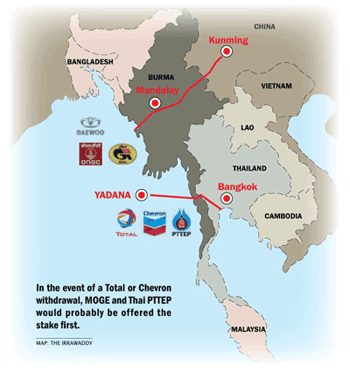Oil and Politics Don’t Mix
The growing revenues from Burma’s oil and gas resources provide financial support to the Burmese military to the detriment of Burma and her peoples
AS the Burmese regime increases its isolation of opposition leader Aung San Suu Kyi and the National League for Democracy, the United Nations and Western governments, especially the US and the European Union, remain steadfast in applying diplomatic pressure on the junta.
Burma’s stubborn military leaders can shrug off Western pressure, however, knowing they can rely on support from such friendly and powerful neighbors as China, India and some Southeast Asian countries, most of which have significant trade and investment links with Burma and which are inclined to follow an engagement-oriented policy towards the regime.
 |
(Map: The Irrawaddy) |
So the question remains: who can influence the Burmese generals to listen to world opinion?
Many observers said that a start could be made on ending ongoing human rights abuses if oil and gas companies operating in Burma used their influence with Burma’s ruling junta, the State Peace and Development Council (SPDC). They said the global and regional energy companies involved in Burma’s oil and natural gas sector are funding the Burmese dictatorship.
It is clear that the military receives the largest share of the official budget—with the help of natural-gas revenue, Burma’s foreign-exchange reserves have reached US $3.6 billion and are expected to increase—which ends up in the pockets of the ruling generals and their cronies, or is allocated to their pet projects. The latter include the new administrative capital at Naypyidaw, the Yadanabon cyber city project between Mandalay and Maymyo, and a nuclear research reactor (as announced by Russia’s Federal Atomic Energy Agency in 2007).
After the latest action against Suu Kyi, the regime’s criminal mismanagement of Cyclone Nargis relief and its brutal crackdown on the September 2007 demonstrations, Burma activists are calling for energy enterprises to carefully consider their priorities before entering deals with the regime.
Matthew Smith, the project coordinator of EarthRights International, an environmental and human rights group with offices in Thailand and Washington, believes there are solid business reasons for energy companies to think twice about accepting Burmese contracts. “Financing the Burmese regime in this way can only reflect poorly on a company’s reputation, and that will ultimately affect their bottom line and ability to capitalize on deals in the future,” he says. “It’s simply bad business.”
However, US-based Chevron and France’s Total—both leading investors in Burma’s oil and gas sector—have declared that they will not pull out of the country, arguing that even if they did withdraw they would be replaced by other competitors. Observers agree that power-hungry neighboring countries, especially China and India, are eager to do business with Burma, hoping to secure some of the fuel supplies that their surging economies need.
Speaking as EU countries mulled action against the junta over its treatment of Suu Kyi, France’s foreign minister, Bernard Kouchner, told members of the French parliament in May that any decision to pull out their national energy giant Total would have serious consequences for the region.
1 | 2 | 3 next page »
|
||
|
||
|
||
|
||
